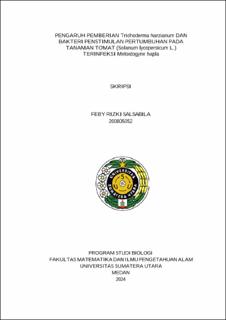| dc.description.abstract | Pathogenic infections caused by root knot nematodes (Meloidogyne hapla) are one of the obstacles in tomato cultivation. Therefore, a biocontrol agent in the form of a nematophagus fungus is needed and the combination of several stimulating bacteria is the advance alternative in reducing the infection of root knot nematodes. This study aims to determine the effect of Trichoderma harzianum in reducing the population of free living nematodes in vitro and to determine the effect of T. harzianum with growth stimulating nitrogen-fixing bacteria Azotobacter sp., phosphate solvent bacteria Bacillus subtilis and IAA-producing bacteria Pseudomonas fluorescens in reducing infection of root knot nematode (Meloidogyne hapla.) in tomato plants in vivo. In vitro testing was carried out by adding 1000 J2 phase free living nematodes to a petri dish containing Corn Meal Agar (CMA) that had been overgrown with T. harzianum. Observations were made every 12, 24, 36, 48 and 72 hours with 3 repetitions to see the reduction number of nematode population. The ability of T. harzianum in reducing root knot nematode infection (Meloidogyne hapla) in tomato plants was observed in vivo by bioassay test using tomato plants treated with 1,5 ml T. Harzianum 107 conidia/ml and growth stimulating bacteria of 1,5 ml/polybag contain 108 CFU/ml. The results of in vitro tests showed that T. harzianum isolate reduce 85% the growth of nematodes. Bioassay test proved that the most effective treatment was on the combination of T. harzianum isolate and 3 stimulating bacteria (J+B3) treated plants with highest percentage 97%. | en_US |


